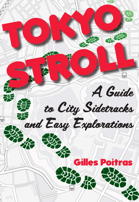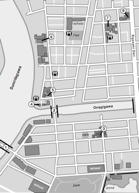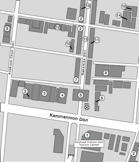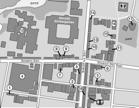











Tokyo Stroll Supplement: Suginami Ku

This page is for locations in the Suginami Ku area of Tokyo. This neighborhood is not part of my book Tokyo Stroll.
For information on Tokyo Stroll and this web supplement see Tokyo Stroll Supplement home page
For users of the Organic Maps, Maps.Me and Google Maps apps the items below have bookmarks you can import into those apps to make navigation easier.
Instructions and links are on the Viewing Locations in Organic Maps, Maps.Me, Google Maps, or Google Earth page.
Some entries on this page may include a note that says "Description to be added soon ." These entries are for items I felt should be listed even if the description is not ready to assist those who wish to plan a trip. When possible I included a link to an official web page, I suggest also doing web searchs for more information.
Suginami ku (杉並区)
Founded in 1947, Suginami ku is mainly residential being on the western edge of the 23 ku area of Tokyo. To the west are the cities of Mitaka and Musashino, to the south is Setagaya ku, the east borders Shibuya ku and Nakano ku which is also to the north east, Nerima ku is to the north.
Official pages for each of the ku of Tokyo will have sections of interest to visitors. These will likely be labeled as dealing with culture, tourism, or events.
Suginami-ku official site: https://www.city.suginami.tokyo.jp
NOTES:
Along the Chūō Line: Much of what I am listing on this page is north or south of four stations on the Chūō Line. The stations are listed below in the order of from east to west: Kōenji Station, Asagaya Station , Ogikubo Station , and Nishi-Ogikubo Station. This means you can plan a day of going from station to station by checking the clusters of bookmarks near them. Unlike the US where major commercial developments are usually on major roadways the commercial centers in Japan are usually near train stations with residential and smaller shopping areas radiating out from there.
Anime related locations: One of the things Suginami Ku is known for is the number of animation studios that have been based in the area over the years. That is reflected in some of the interesting places found there.
44Sonic
A self proclaimed "otaku bar" for fans of popular culture. Anime, manga, games, and films. The bar is not only decorated with various anime/manga etc, items they also host game competitions, speakers, song competitions, and more. The owner is Kimura Keisaku an actor who also has worked on many tokusatsu programs doing visual effects.
NEAREST TRAIN/SUBWAY STATION: Asagaya Station (JR Chūō-Sōbu Line, JR Chūō Line (Rapid)
WEB: http://www.44sonic.net
Asagaya Pearl Center Shopping Street (阿佐谷パールセンター 商店街)
A typical covered shopping street much like those found in various cities in Japan. The proximity to the Asagaya Station makes this one easy to visit. The street has a long history, from being part of a road to Kamakura, a pilgrimage route to the Buddhist temple Myōhōji. The Sobu streetcar line connected this area to the center of Tokyo in 1922, the Great Kantō Earthquake of 1923 resulted in many moving to this area. After WWII the locals redeveloped the area near the street and solicited proposals for a new name, Pearl Center in English was chosen. The roof was added in 1962.
NEAREST TRAIN/SUBWAY STATION: Asagaya Station (JR Chūō Line (Rapid), JR Chūō-Sōbu Line)
CAFE and BAR POCO
Manga Cafe and Bar in Ogikubo.
Description to be added soon
NEAREST TRAIN/SUBWAY STATION: Ogikubo Station (JR Chūō Line (Rapid) and JR Chūō-Sōbu Line)
WEB: https://poco-home.jimdofree.com
Horinouchi Myōhōji (堀之内妙法寺)
A large Buddhist temple complex founded in the Edo Period as a Shingon Buddhist temple, it later became a Nichiren temple. Hiroshige included it in his series of prints of the famous places of Edo. Part of the complex was damaged in the Great Kantō Earthquake but it was not harmed in WWII. Some of the structures are designated as cultural assets by the government. Among these are two gates; the Niōmon, which has statues donated by shōgun Tokugawa Ietsuna, and the Tetsumon, an iron gate with Western style elements designed by Josiah Conder in 1878. The design, with its polychrome phoenix, is very unusual for a Buddhist temple and became a popular attraction at the time. Many of the other buildings area also designated as cultural assets. There is also a monument to the writer and novelist Ariyoshi Sawako who lived nearby and often visited the temple. Some may think this is a little unusual as she was a Christian, however she is said to have loved the temple grounds.
NEAREST TRAIN/SUBWAY STATIONS: Shin-Koenji Station (Tokyo Metro Marunouchi Line), Higashi-Koenji Station (Tokyo Metro Marunouchi Line), Kōenji Station (JR Chūō Line (Rapid), JR Chūō-Sōbu Line)
WEB: http://www.yakuyoke.or.jp
Igusa Hachiman Shrine / Igusa Hachimangū (井草八幡宮)
Description to be added soon
NEAREST TRAIN/SUBWAY STATION: Nishi-Ogikubo Station (JR Chūō Line (Rapid) and JR Chūō-Sōbu Line)
WEB: https://www.igusahachimangu.jp/index2.html
Inazuma Cafe (イナズマ カフェ)
A small two story cafe with the walls decorated by various creators of anime and manga. This is quite appropriate given the high number of anime studios in the neighborhood. They have a kids menu and even one for dogs, yes pets are welcome.
NEAREST TRAIN/SUBWAY STATION: Ogikubo Station (JR Chūō Line (Rapid) and JR Chūō-Sōbu Line), Ogikubo Station (Tokyo Metro Marunouchi Line)
Jikō (慈光)
An antique shop with a good variety of items founded in 1982 and located in a neighborhood with about 60 other small antique stores. Here you will find art, kimono, small objects, furniture, etc.
NEAREST TRAIN/SUBWAY STATION: Nishi-Ogikubo Station (JR Chūō Line (Rapid) and JR Chūō-Sōbu Line)
CLOSED: Wednesdays
WEB: https://antiquesjikoh.com/jikoh/
La Porta Izumi (ラポルタイズミ)
Description to be added soon
NEAREST TRAIN/SUBWAY STATION: Daitabashi Station (Keiō Line)
Monjuin (文殊院)
Description to be added soon.
NEAREST TRAIN/SUBWAY STATION: Hōnanchō Station (Tokyo Metro Marunouchi Line)
Renkōji (蓮光寺)
Description to be added soon.
NEAREST TRAIN/SUBWAY STATION: Higashi-Koenji Station (Tokyo Metro Marunouchi Line)
Risshō Kōseikai Great Sacred Hall / Risshō Kōseikai Taiseidō (立正佼成会大聖堂)
Description to be added soon
NEAREST TRAIN/SUBWAY STATION: Nakano-fujimichō Station (Tokyo Metro Marunouchi Line)
WEB: https://www.kosei-kai.or.jp
Seikō Lodging (西郊ロッヂング)
NEAREST TRAIN/SUBWAY STATION: Ogikubo Station (JR Chūō Line (Rapid) and JR Chūō-Sōbu Line)Description to be added soon
Shoan Inari Jinja (松庵稲荷神社)
Aka Nishi-Takaido Shoan Inarijinsha Description to be added soon
NEAREST TRAIN/SUBWAY STATION: Nishi-Ogikubo Station (JR Chūō Line (Rapid) and JR Chūō-Sōbu Line)
WEB: https://www.shimotakaido.org/shouan/index.html
Star Road (スターロード)
Description to be added soon.
NEAREST TRAIN/SUBWAY STATION: Asagaya Station (Chūō Line (Rapid) and Chūō-Sōbu Line)
Suginami Animation Museum (東京工芸大学 杉並アニメーションミュージアム)
Since 2004 this museum has hosted displays on animation. There are three parts, one on history which includes a large timeline, another is on the processes used to make animation including a small recording studio, and there is an exhibit of original images of several types used in animation which changes every few months. There is also a small library and theater. Part of the signage is also in English, admission is free, reservations are required for groups of 6 or more, the entrance is on the third floor.
CLOSED: Mondays and around New Years. Open on national holidays, closed the following day.
ACCESS:
From the south:
Ogikubo Station and Nishi-Ogikubo Station (both: JR Chūō Line (Rapid) and JR Chūō-Sōbu Line), Ogikubo Station (Tokyo Metro Marunouchi Line)
From the North:
Kami-Igusa Station (Seibu Shinjuku Line), Shakujii-kōen Station (Seibu Ikebukuro Line, Tokyo Metro Fukutoshin Line, Tokyu Toyoko Line, Minatomirai Line)
WEB: https://sam.or.jp/english_home
Wadabori Park / Wadabori Kōen (和田堀公園)
Description to be added soon
NEAREST TRAIN/SUBWAY STATION: Hōnanchō Station (Tokyo Metro Marunouchi Line)
WEB: https://www.tokyo-park.or.jp/park/wadabori/index.html
Zenpukuji Park / Zenfukuji Kōen (善福寺公園)
Description to be added soon
NEAREST TRAIN/SUBWAY STATION: Nishi-Ogikubo Station (JR Chūō Line (Rapid) and JR Chūō-Sōbu Line)
WEB: https://www.tokyo-park.or.jp/park/zenpukuji/
Zenpukuji River Green Park / Zenpukujigawa ryokuchi (善福寺川緑地)
Description to be added soon
NEAREST TRAIN/SUBWAY STATION: Minami-Asagaya Station (Tokyo Metro Marunouchi Line)
WEB: https://www.tokyo-park.or.jp/park/zempukujigawa-ryokuchi/
Back to the Tokyo Stroll Supplement home page - Privacy Notice - Back to Gilles' home page
Created October 30, 2022 | Content last updated October 14, 2025